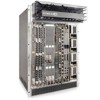Dell Force10 E600i Quick Start Guide - Page 28
Supplying Power, Booting to the CLI Prompt
 |
View all Dell Force10 E600i manuals
Add to My Manuals
Save this manual to your list of manuals |
Page 28 highlights
Supplying Power Step Task 1 Energize the remote power source. 2 Flip the switch on the AC power supplies or DC PEM to the ON position. 3 In a DC PEM, the Status LED should be green. In an AC Power Supply, the top Input AC and Output LEDs should be green. If these LEDs are not lit or the Status LED is amber on a DC PEM, check that the unit is properly installed. Verify the power source. If the LEDs remain unlit, power off all modules and replace the unit. 4 The fan tray LED should be green (online). Verify that air is flowing through the chassis. If the fans are not operating properly or air is not flowing through the chassis, power off the chassis at the power module. Ensure that the fan is properly installed. Verify the power source. If the fan impeller LED remains unlit, replace the fan impeller. To turn the power off on the power modules, use one of the following methods: • On the DC PEMs, flip the switch to the OFF position. Make sure the AC power supplies Status LEDs are not lit. • On the AC Power Supplies, flip the switch to the OFF position and unplug the power cord from the socket on the front of the Power Supply. Make sure the Input AC and Output DC LEDs are not lit (they may flash as they power down.) Booting to the CLI Prompt After you supply power to the system, the following should occur: • The fans should be operating. • The green (online) fan tray, power module, RPM, SFM, and line card LEDs should be lit and remain lit as long as the system is receiving power and is operational. When you supply power to the system, the system performs a series of power-on self tests. RPM, line card, and SFM LEDs blink as the diagnostic programs run. No user interaction is required at this point. Observe the process on your console 26 Installing the Hardware















